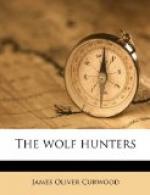Running to the prostrate Roderick, Wabi drew him quickly upon his back, clutched his rifle in the grip of his arm, and started again for the tamaracks. Only once did he look back, and then he saw the wolves gathering in a snarling, fighting crowd about their slaughtered comrades. Not until he had reached the shelter of the tamaracks did the Indian youth lay down his burden, and then in his own exhaustion he fell prone upon the snow, his black eyes fixed cautiously upon the feasting pack. A few minutes later he discerned dark spots appearing here and there upon the whiteness of the snow, and at these signs of the termination of the feast he climbed up into the low branches of a spruce and drew Roderick after him. Not until then did the wounded boy show visible signs of life. Slowly he recovered from the faintness which had overpowered him, and after a little, with some assistance from Wabi, was able to place himself safely on a higher limb.
“That’s the second time, Wabi,” he said, reaching a hand down affectionately to the other’s shoulder. “Once from drowning, once from the wolves. I’ve got a lot to even up with you!”
“Not after what happened to-day!”
The Indian’s dusky face was raised until the two were looking into each other’s eyes, with a gaze of love, and trust. Only a moment thus, and instinctively their glance turned toward the lake. The wolf-pack was in plain view. It was the biggest pack that Wabi, in all his life in the wilderness, had ever seen, and he mentally figured that there were at least half a hundred animals in it. Like ravenous dogs after having a few scraps of meat flung among them, the wolves were running about, nosing here and there, as if hoping to find a morsel that might have escaped discovery. Then one of them stopped on the trail and, throwing himself half on his haunches, with his head turned to the sky like a baying hound, started the hunt-cry.
“There’s two packs. I thought it was too big for one,” exclaimed the Indian. “See! Part of them are taking up the trail and the others are lagging behind gnawing the bones of the dead wolf. Now if we only had our ammunition and the other gun those murderers got away from us, we’d make a fortune. What—”
Wabi stopped with a suddenness that spoke volumes, and the supporting arm that he had thrown around Rod’s waist tightened until it caused the wounded youth to flinch. Both boys stared in rigid silence. The wolves were crowding around a spot in the snow half-way between the tamarack refuge and the scene of the recent feast. The starved animals betrayed unusual excitement. They had struck the pool of blood and red trail made by the dying moose!
“What is it, Wabi?” whispered Rod.
The Indian did not answer. His black eyes gleamed with a new fire, his lips were parted in anxious anticipation, and he seemed hardly to breathe in his tense interest. The wounded boy repeated his question, and as if in reply the pack swerved to the west and in a black silent mass swept in a direction that would bring them into the tamaracks a hundred yards from the young hunters.




